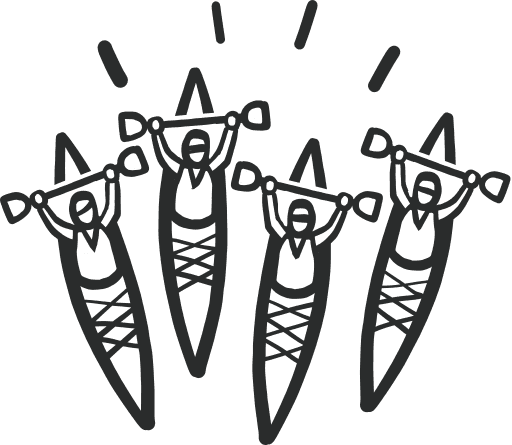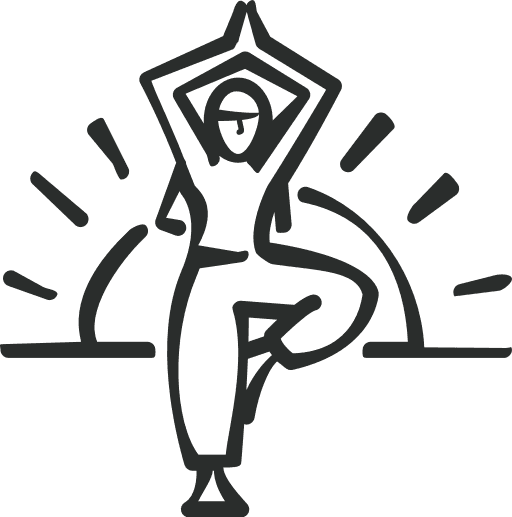
Trek the Everest Panorama Trail
Head high into the Everest region to hike among epic Himalayan scenery and explore Sherpa culture in the Sagarmartha National Park
What's Included?
Activities & Certified Guides
All itinerary activities with expert, local, English-speaking guidesAccommodation
2 nights in a hotel in Kathmandu, 1 night glamping and 7 nights in teahousesMeals
2 hotel breakfasts, plus welcome/farewell dinners in KathmanduInternal Flights & Transfers
Return flights between Manthali and Lukla; all airport transfers, and everything in betweenPermits & Porterage
Porters to carry your luggage on the trek, plus all your entry fees and permitsSmall Like-minded Groups
Solo-friendly by design, join our small n’ sociable groups of up to 12 like-minded, active and outdoorsy people…
…
What's it like?

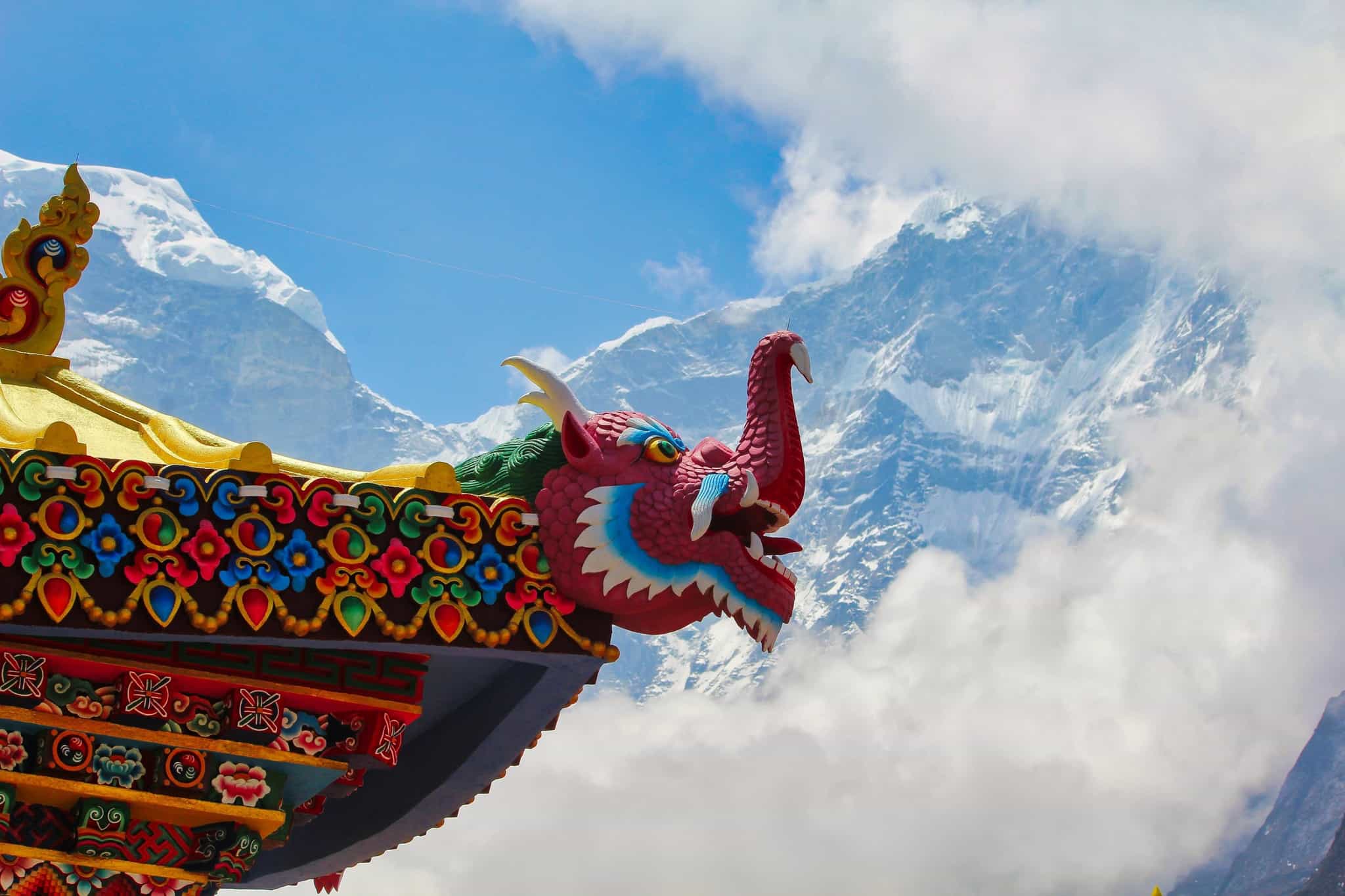
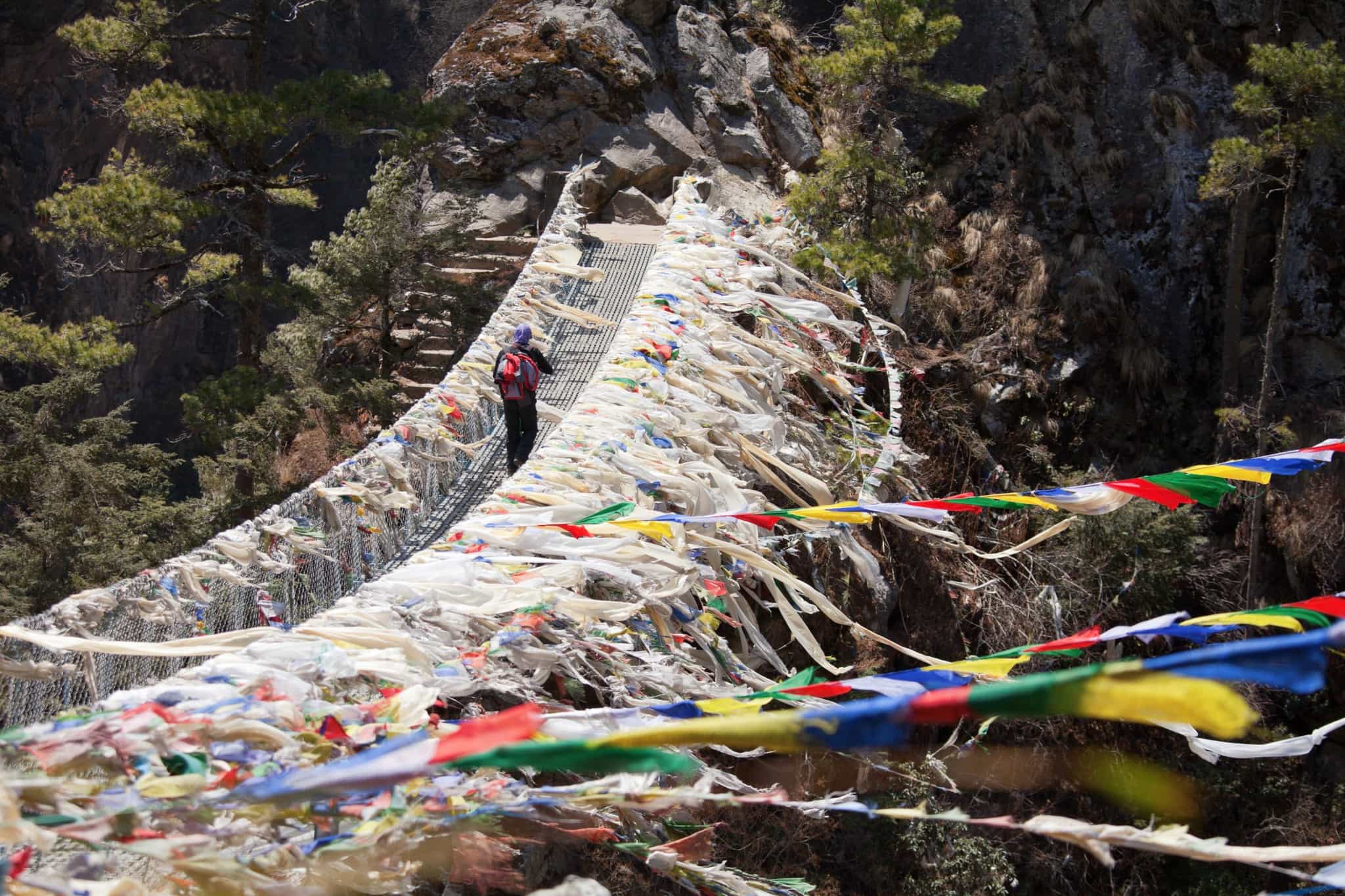
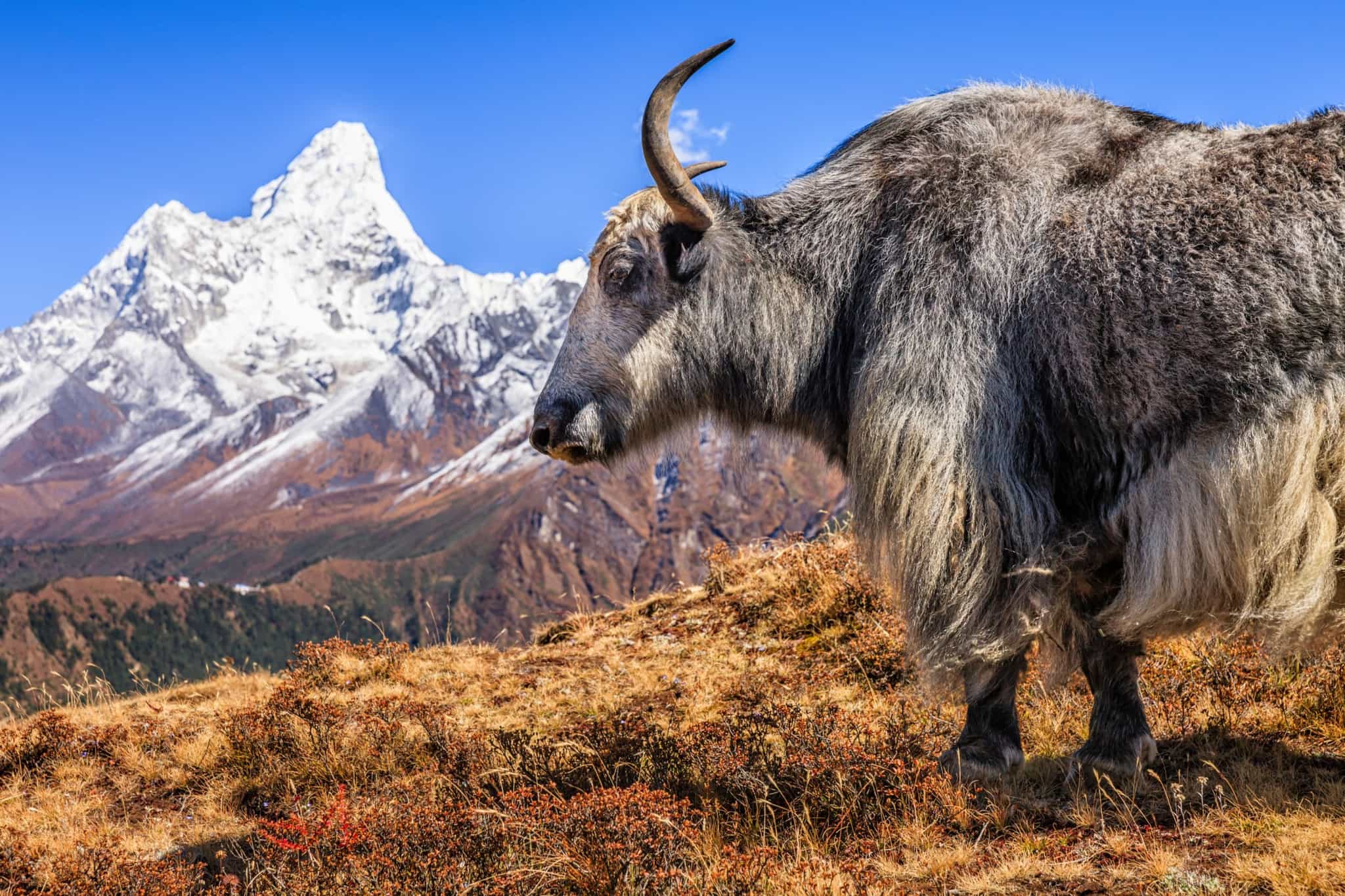
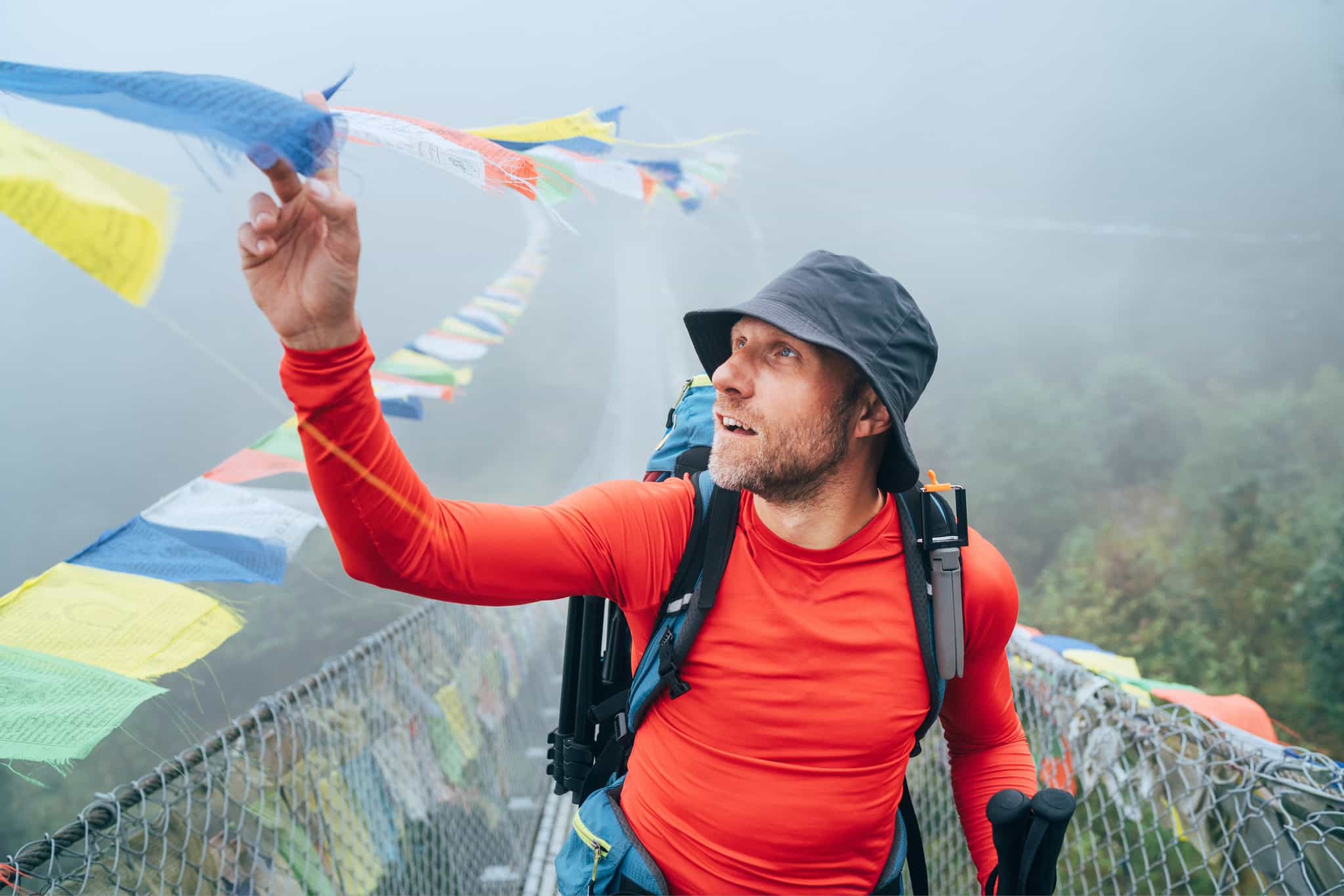
Trek through the Khumbu Valley to the Sherpa capital of Namche Bazaar and on to Tengboche Monastery, one of the world's highest Buddhist gompas
Enjoy many of the highlights of the challenging Everest Base Camp trek, but at a more relaxed pace and without the extreme altitudes
Set your eyes on the highest point on Earth as you hike among views of Everest, Lhotse, Ama Dablam, Thamserku and many more snow-capped giants
Want to learn more? Read our handy guide or take on a bigger challenge with our full trek to Everest Base Camp
Key Information
Day 1
Welcome to Kathmandu!
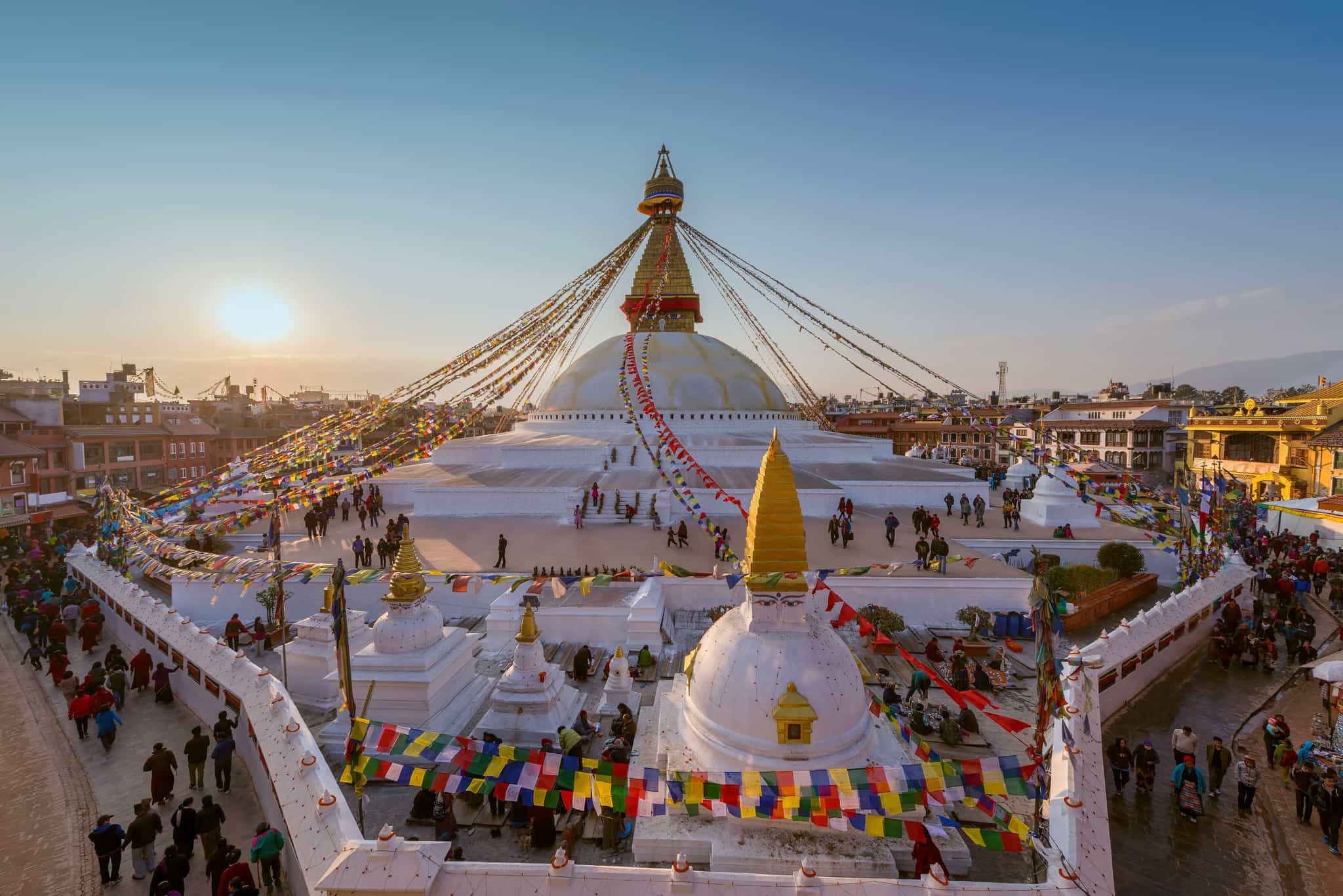
After checking in to your hotel, meet up with your guides and fellow travellers to run through the details of the adventure to come. You'll finish the day with a group dinner at an authentic Nepali restaurant to get to know your team ahead of the trek.
Day 2
Drive to Manthali
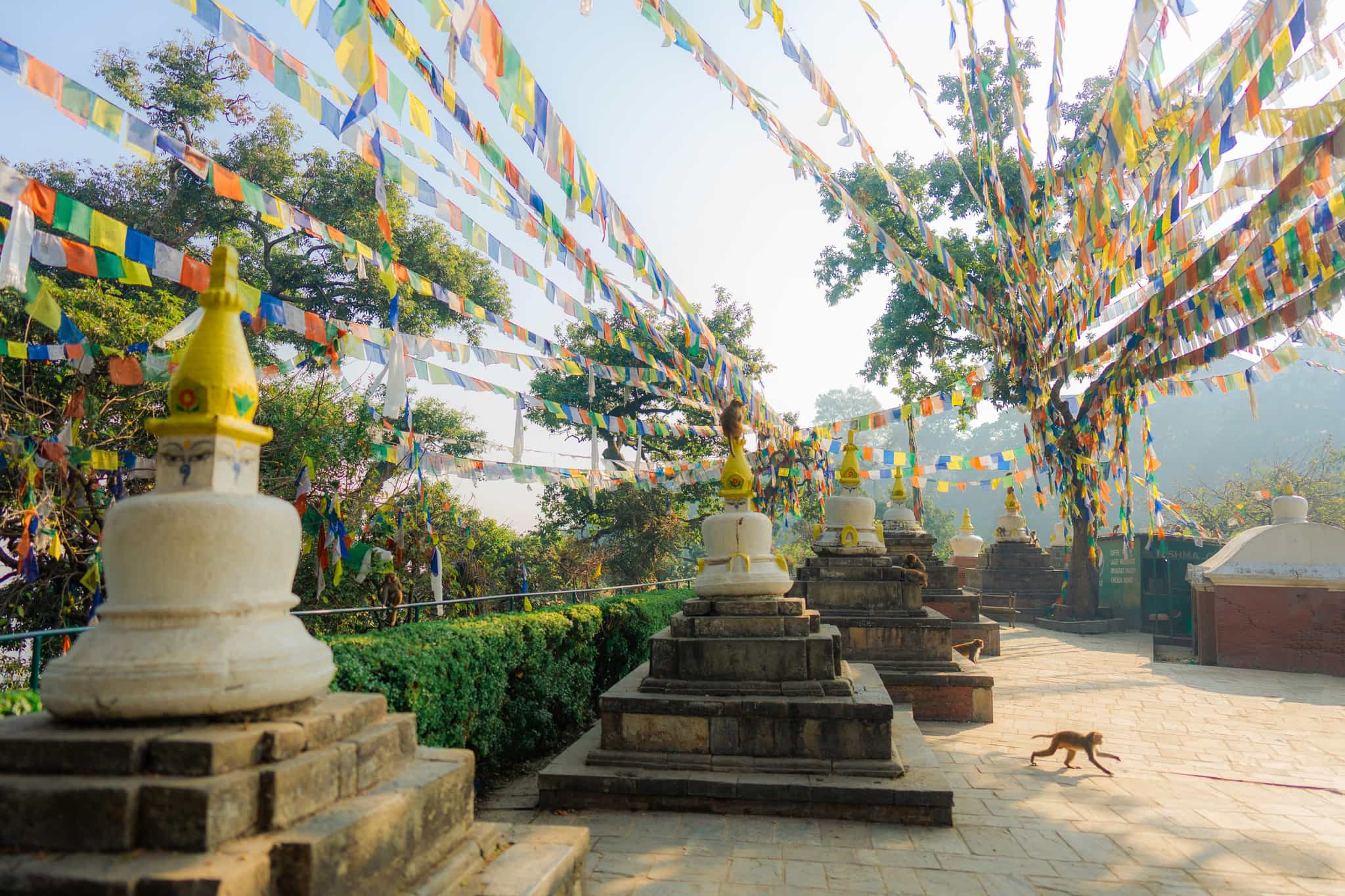
Driving
This morning you'll jump on the bus to Manthali – this remote region is where most flights to Lukla now depart from (although if you're lucky, they sometimes depart from Kathmandu). You'll spend the night in safari tents near the small airport, so you're ready to board an early morning flight. The resort has an on-site swimming pool, bar and restaurant so you can unwind after the drive.
Day 3
Start your trek in the Khumbu
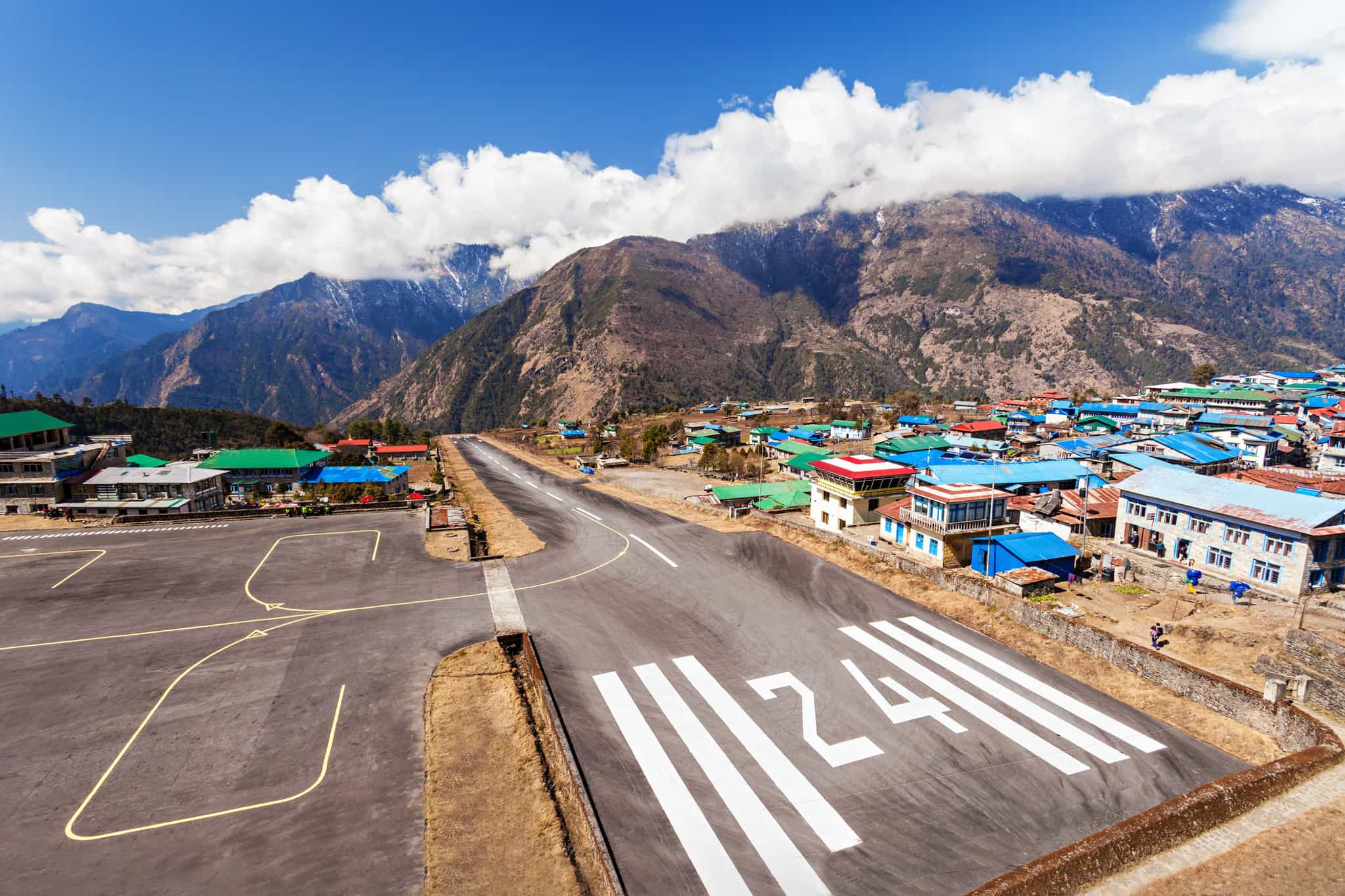
Hiking
Today starts with a short, twenty-minute flight to Lukla where you'll be treated to excellent views of the snow-capped peaks of the Himalayas. Perched high in the mountains, Lukla sits at 2840m and is the gateway to Sagamartha National Park and Mount Everest. After meeting the other crew members you'll start your trek, passing through the prosperous village of Lukla before reaching Phakding on the Dudh Kosi River. You'll spend the night in the village where you can visit the nearby monastery for your first taste of Sherpa culture and Tibetan Buddhism, themes present throughout your trek over the days to come. Spend the evening in your cosy teahouse enjoying a herbal tea in front of the yak-dung fuelled stove.
Please note that occasionally, Lukla flights can be delayed or cancelled for safety reasons – see the FAQs for further information.
Day 4
Trek to the Sherpa capital of Namche Bazaar (3440m)
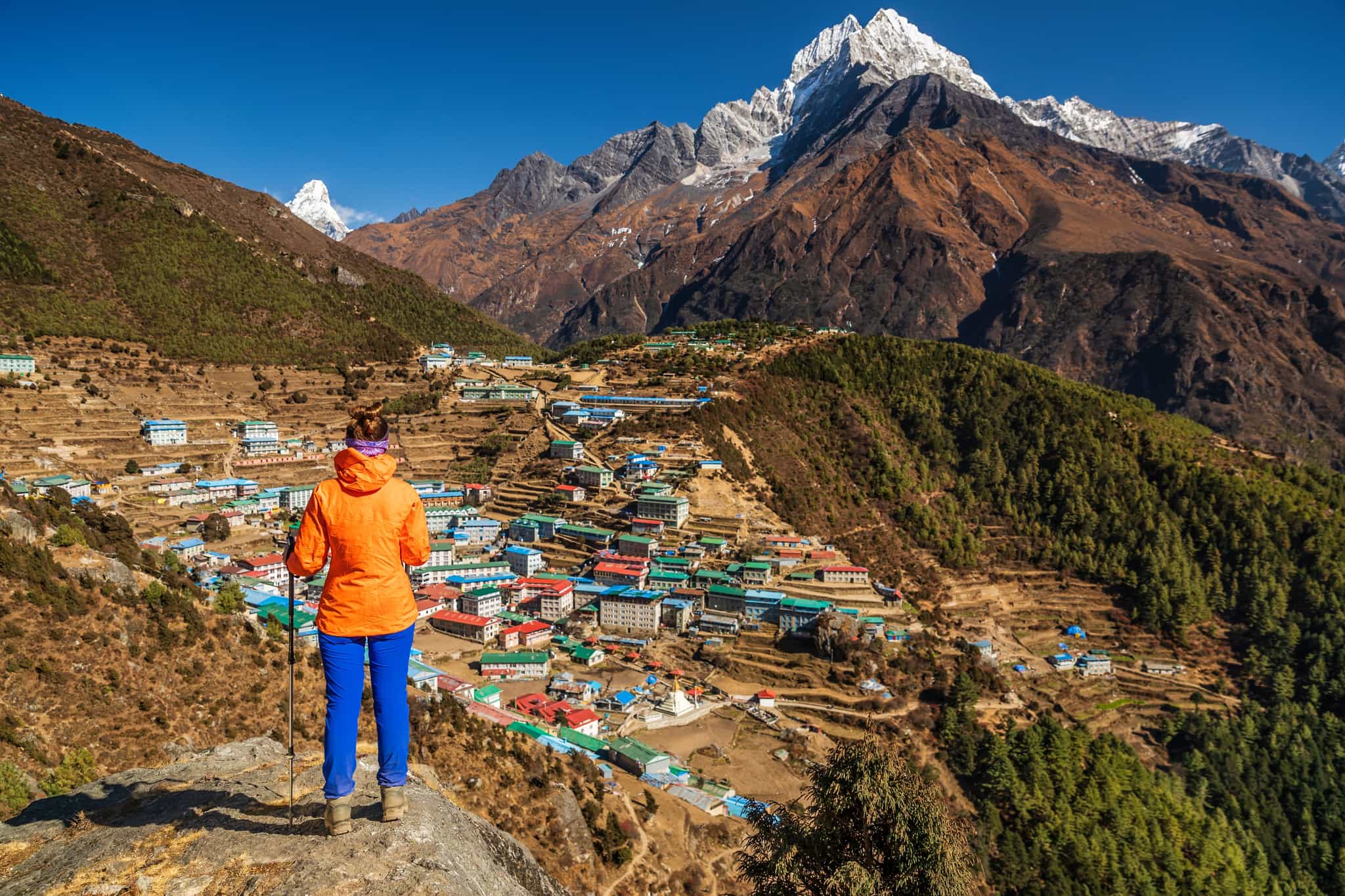
Hiking
Start today with a walk through beautiful pine forests, following the trail to the Dudh Koshi River. One of the (many) bridges you'll cross is the famous Hillary Suspension Bridge – named after the legendary mountaineer who was the first to summit Everest with Tenzing Norgay in 1953, it has a particularly epic viewpoint of the gleaming Mount Thamserku (6618m). From here, continue through the village of Jorsale before a challenging uphill climb to Namche Bazaar, where you'll get your first glimpse of the mighty Everest.
Day 5
Acclimatise and explore Namche (3440m)
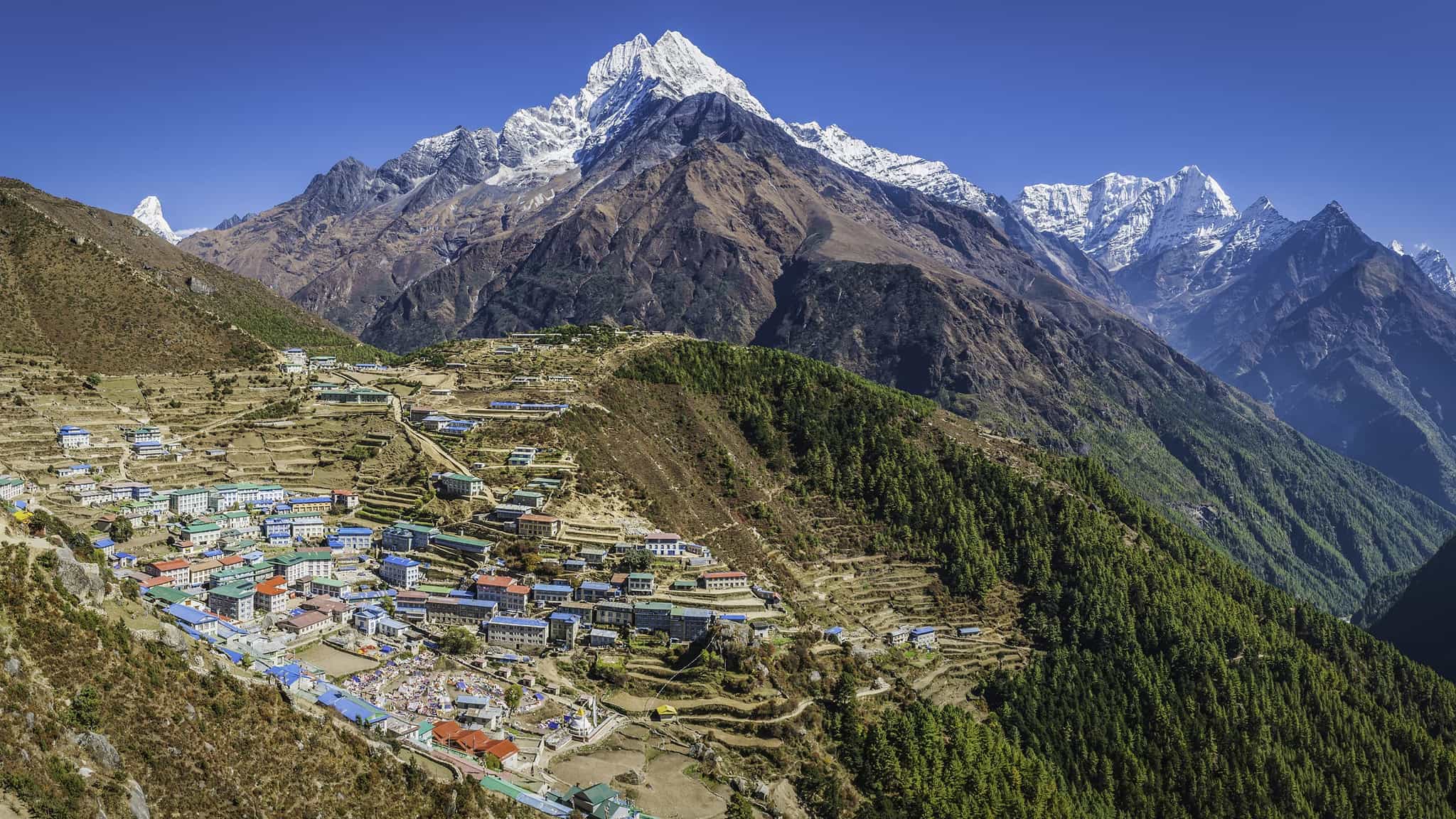
Today will be a rest day in order to acclimatise to the altitude – but rest assured, there’ll be no time to get bored. Despite its remote location, Namche is a fun place to spend time – you can explore the bakeries, hiking and craft shops, watch old Everest films at the cafe cinema, or even head to the highest Irish pub in the world. You'll also have the opportunity to hike to a nearby viewpoint and enjoy mammoth vistas of Mount Everest, Ama Dablam, Thamserku, Lhotse and more.
Day 6
Trek from Namche to Khumjung Village (3790m)
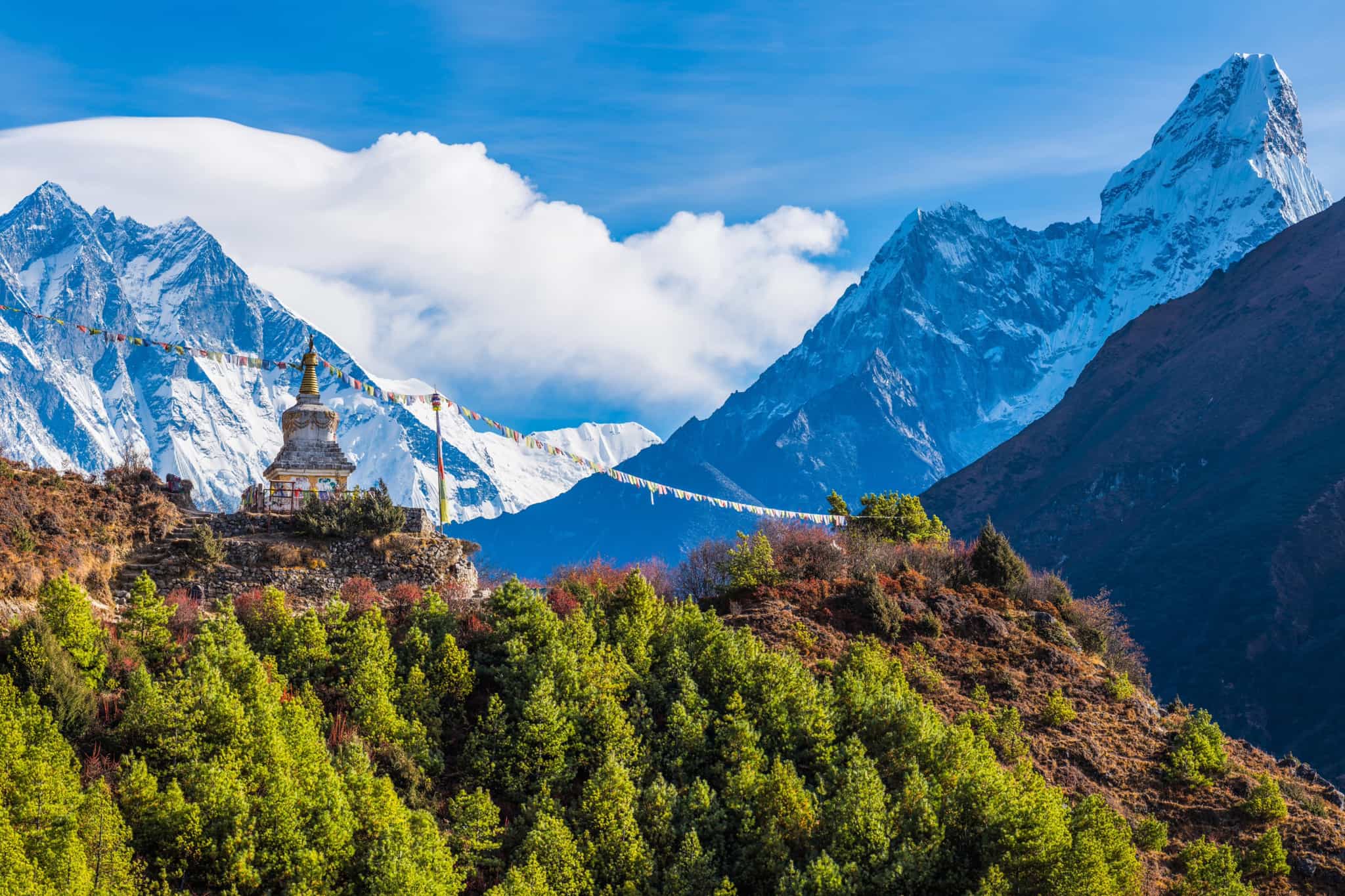
Hiking
Today, climb above Namche Bazaar to seek out one of the most stunning panoramic viewpoints in the Himalayas, where you'll be treated to breathtaking views of several of the world's highest mountains, among countless other snow-capped peaks. Stroll through the Khumjung Valley, taking in the remote mountain communities of Khunde and Khumjung. You'll pass the Khunde Hospital and Khumjung Hillary School, both built by Sir Edmund Hillary following his Everest ascent, and the intriguing Khumjung Monastery, which claims to house a relic of a 300-year old yeti scalp.
Day 7
Trek to Tengboche Monastery (3860m)
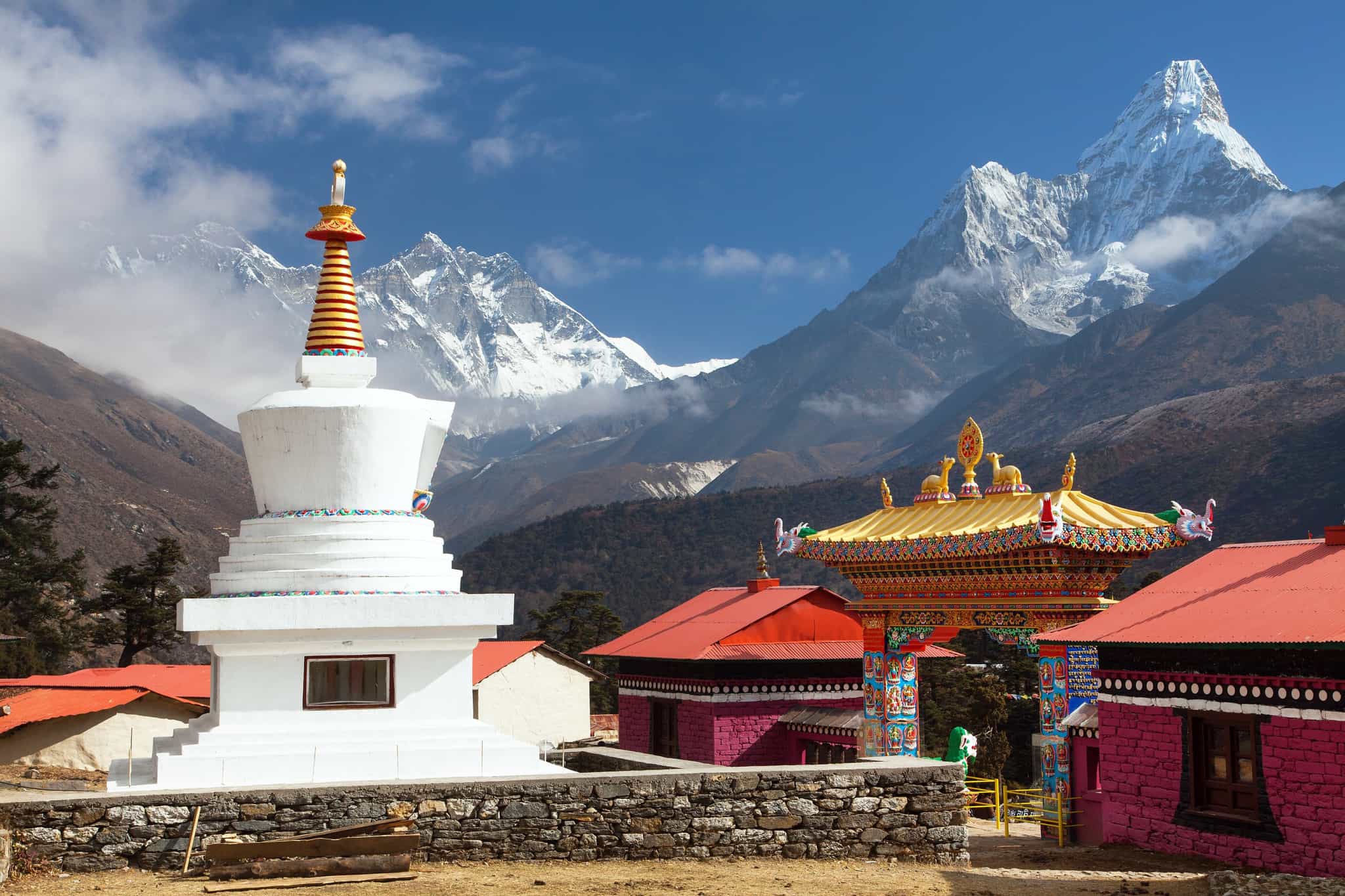
Hiking
Today the path forks, guiding you northeast into a tributary valley, revealing more stunning scenery as you climb the steep slopes towards the revered village of Tengboche. This hallowed ground, home to the famous Tengboche Monastery, also serves as a crucial grazing area for yaks and is the highest sacred site of its kind in the world. From here, drink in the breathtaking views of some of the Himalayas' most iconic peaks, including Nuptse, Lhotse, Ama Dablam – and, of course, the mighty Everest. A night’s stay in Tengboche rounds off a remarkable day.
Day 8
Head back down to Namche (3440m)
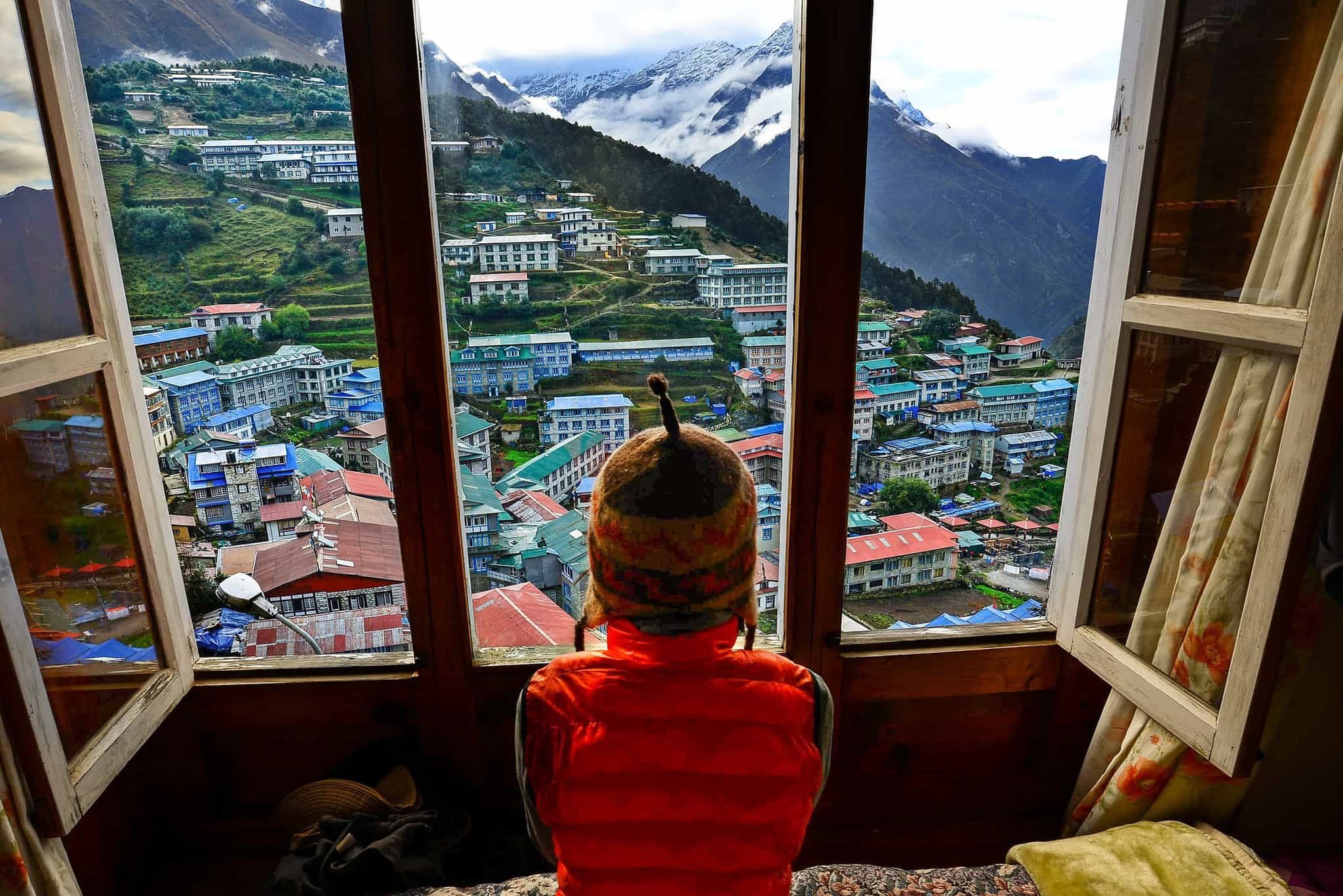
Hiking
After your night in the spiritual setting of Tengboche it's time to start your descent back down the valley. You'll pass the village of Phunke Teng, crossing a large suspension bridge on your way, and have the chance to soak up more incredible views of the ever-present Himalayan peaks high above you. The going is much easier on the way down, now that you are acclimatised to the altitude, so you'll have more energy to capture those perfect photos and enjoy the journey. Continuing for a couple of hours, you'll return to Namche Bazaar where you'll have the afternoon to explore the town and enjoy a last evening in the Sherpa capital.
Day 9
Namche to Lukla (2840m)
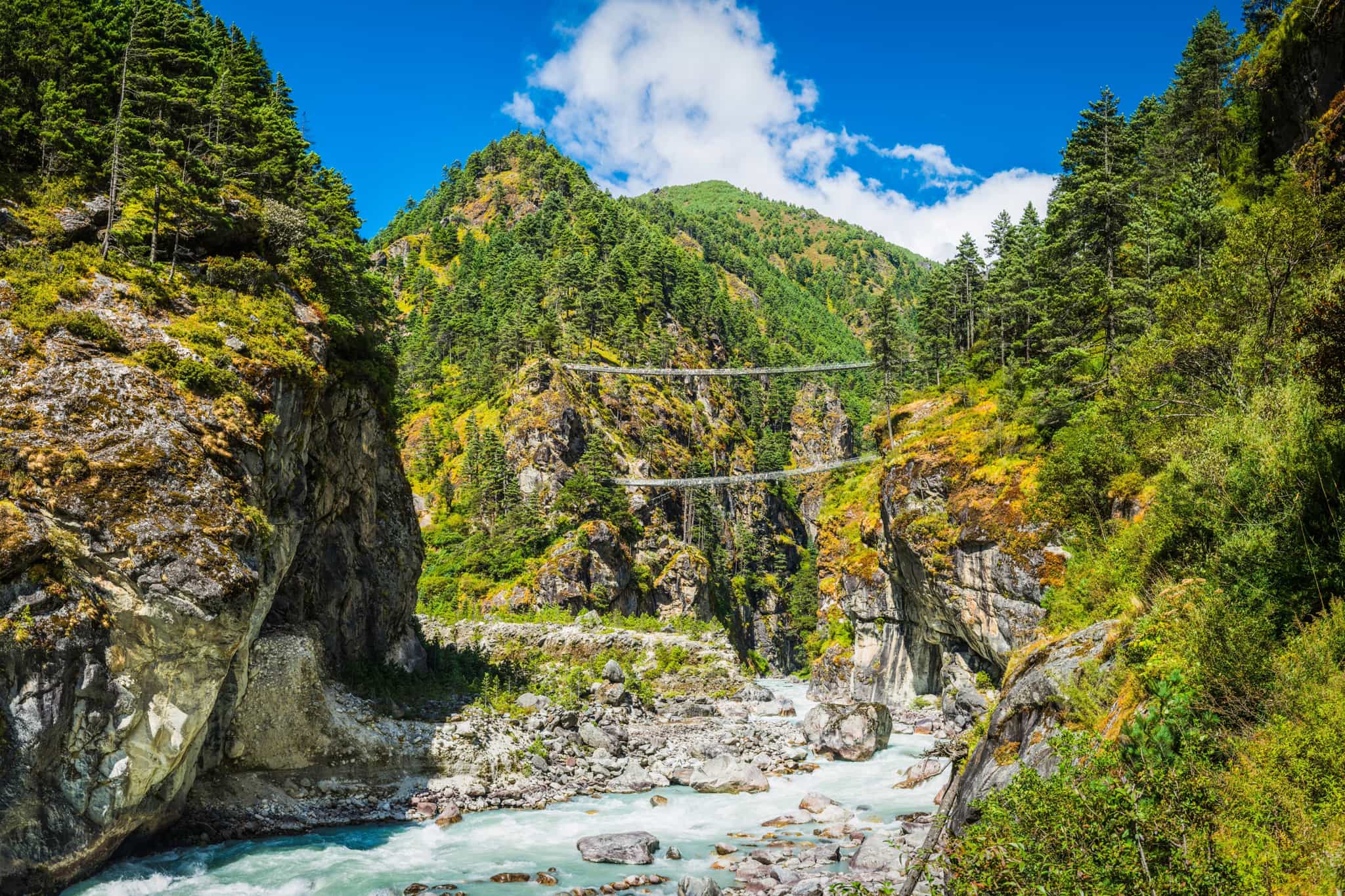
Hiking
Set off for the final descent into Lukla (2860m). On the way, you'll trek through a forest of rhododendrons and pine until you reach a Sherpa village. Here, you’ll have the opportunity to say your final goodbyes to the local team before moving on to Lukla.
Day 10
Back to Kathmandu
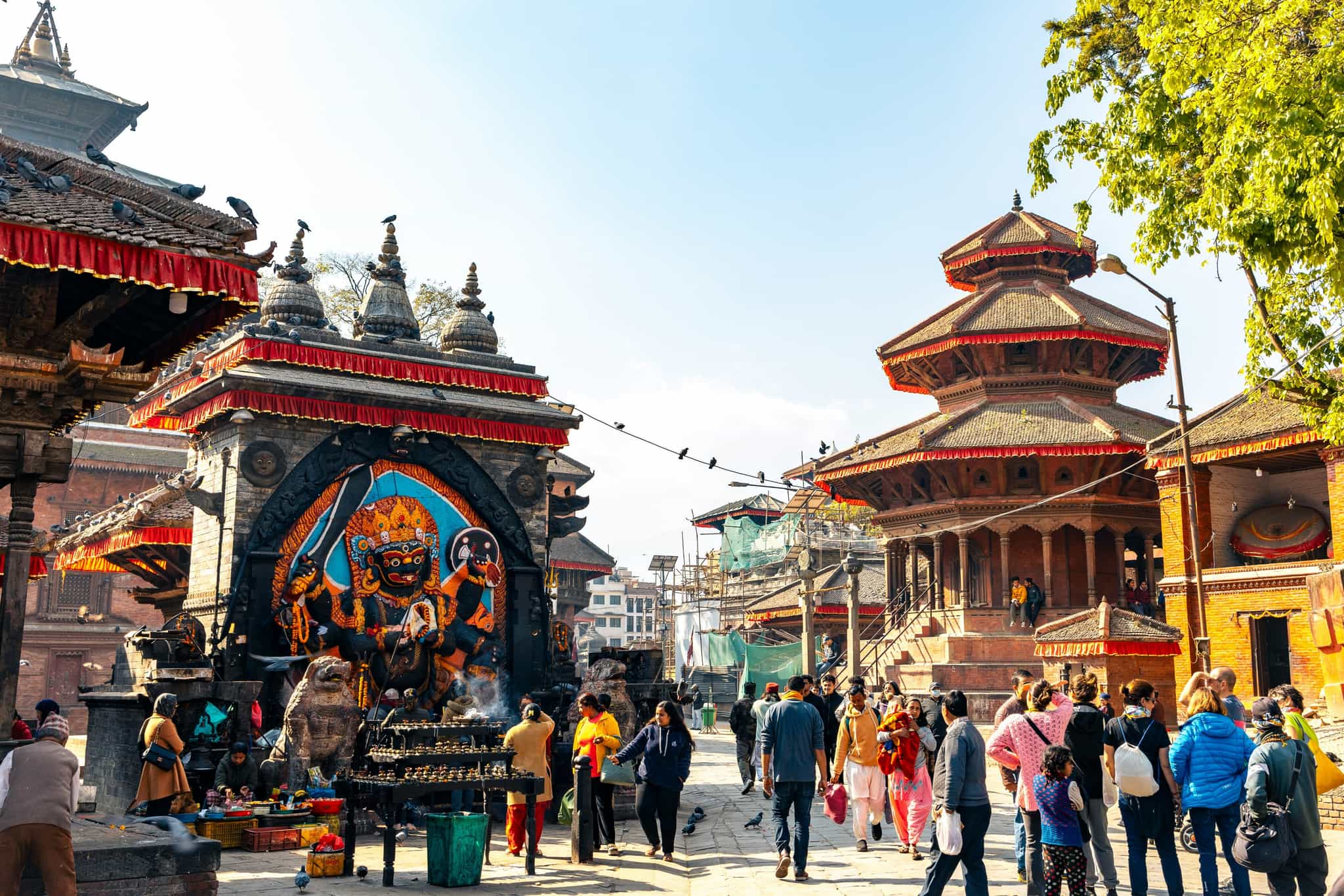
Driving
Fly back to Manthali after your incredible mountain journey. You'll drive back to Kathmandu in time for some well-earned beers and a celebratory dinner.
Day 11
Time to head home
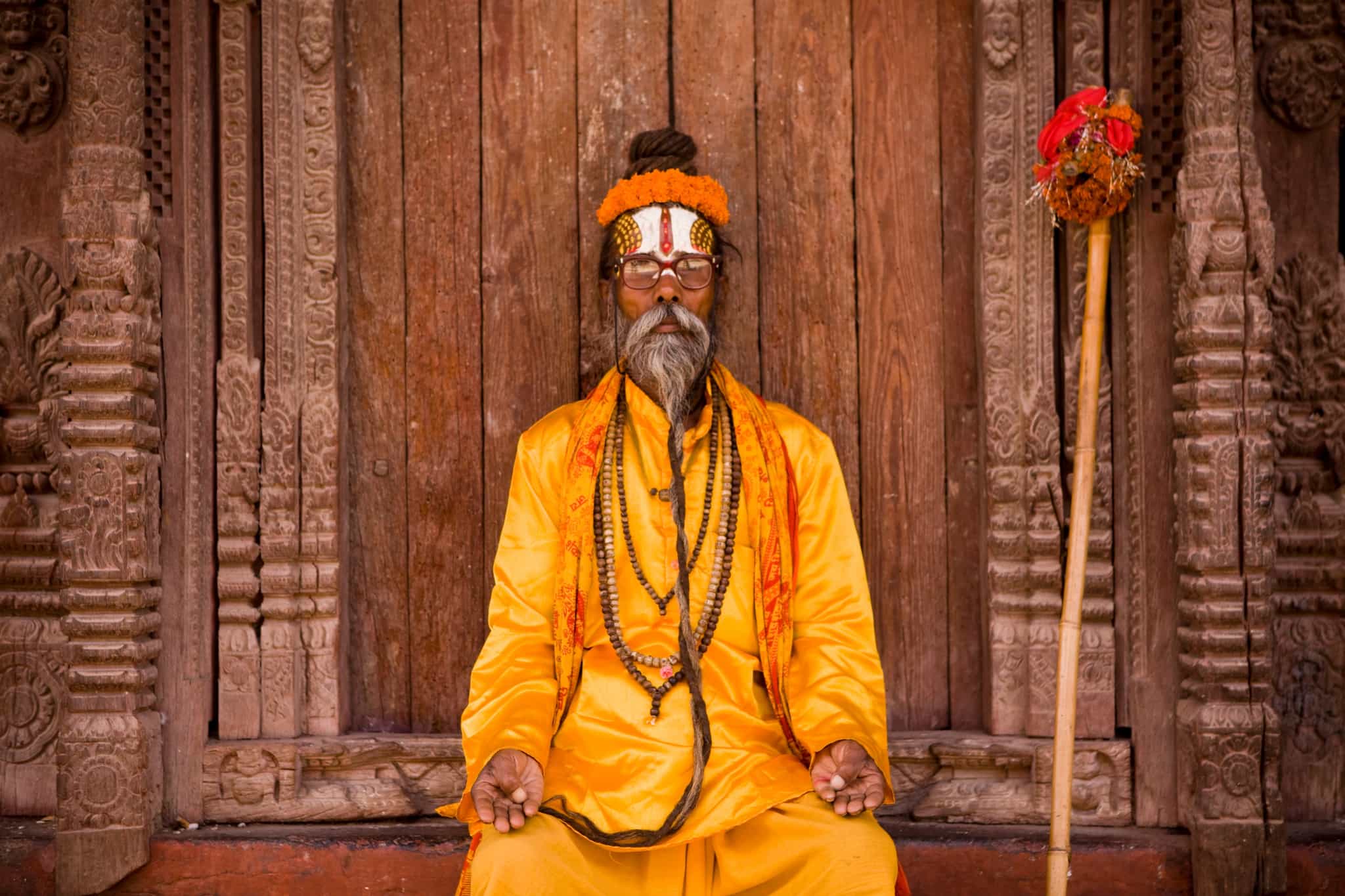
Enjoy a well-earned lie in and breakfast at your hotel, then spend your last day exploring the city before heading back to the airport, and reality.
The Area
Logistics
Starts
Kathmandu Airport (KTM)
Any time on Day 1
Ends
Kathmandu Airport (KTM)
Any time on Day 11
Transfers
Airport arrival and departure transfers are included in the trip cost, no matter when you arrive and depart (even if booking extra nights before or after the trip), provided you have completed your passenger information form and have supplied your flight details in advance.
Travel options
There are regular flights to Kathmandu from major airports in the UK and Europe.
Day 1
Breakfast
Lunch
Dinner
Day 2
Breakfast
Lunch
Dinner
Day 3 – Day 4
Breakfast
Lunch
Dinner
Day 5
Breakfast
Lunch
Dinner
Day 6 – Day 9
Breakfast
Lunch
Dinner
Day 10
Breakfast
Lunch
Dinner
Day 11
Breakfast
Lunch
Dinner
What is the food like?
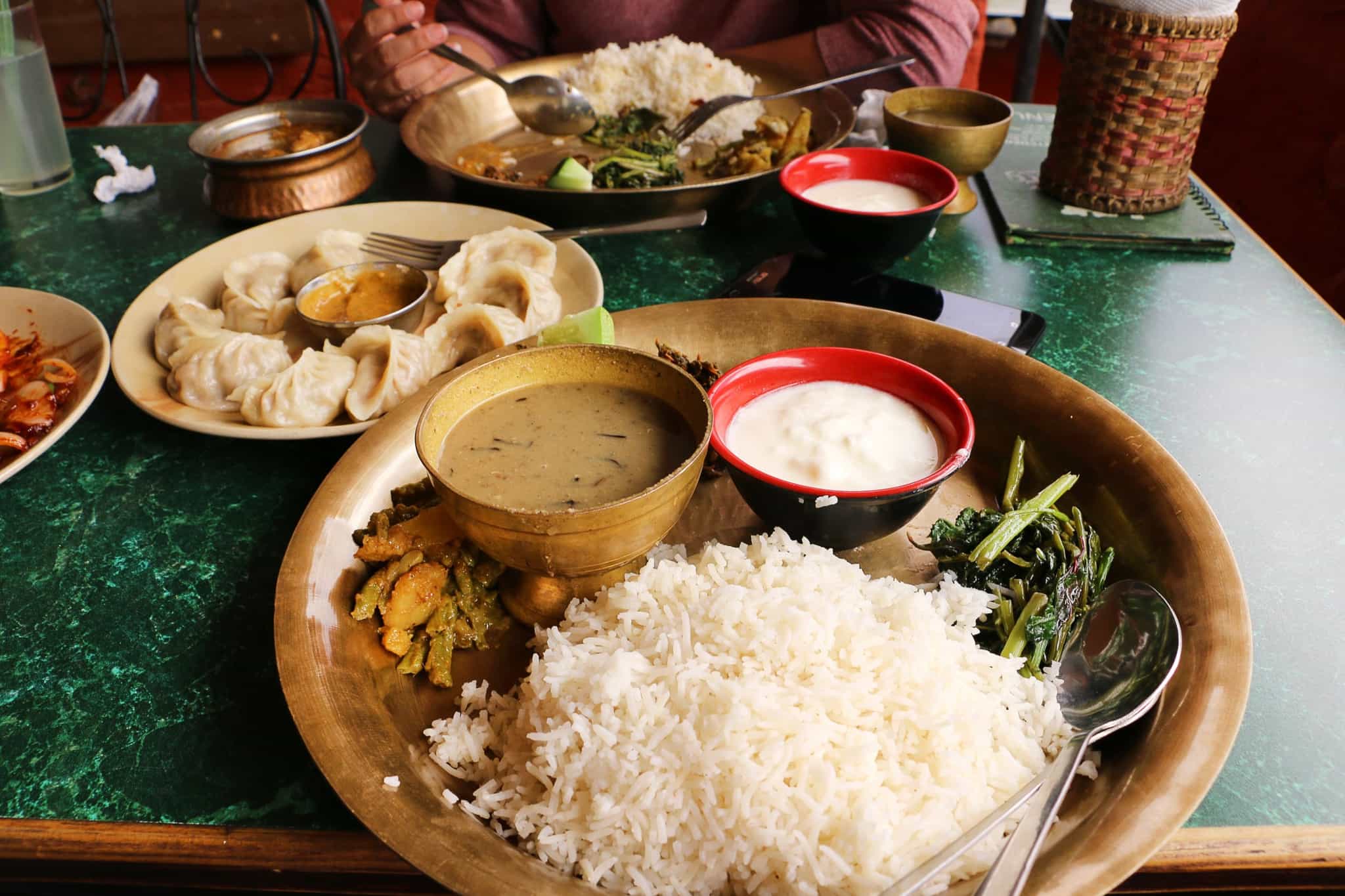
Breakfast is usually hot porridge, muesli or Tibetan bread served with an omelette or boiled eggs. The menus in the teahouses are very similar at every stop and there will usually be a choice of traditional Nepalese dhal bhat (a mixed plate of lentils, rice, vegetables and pickles - delicious and healthy), Nepalese dumplings (momos), mixed noodles, pasta and even pizza. Although meat is available at some teahouses, we suggest you ask your guide for advice about consumption as it tends to depend on how far it has travelled as to whether it is a safe option.
Dairy-free, vegan or vegetarian diets can be catered for while trekking although meals may get a bit repetitive – dhal bhat will likely be your go-to staple. Gluten-free/coeliac diets are tricky to cater for on teahouse treks (beware that powdered soups and seasonings used often contain gluten, and cooking oil is commonly reused and may cause cross-contamination). Please explain your dietary requirements to your guide so that they can assist when ordering, and bringing along some extra food/snacks is advisable.
What is the accommodation like?
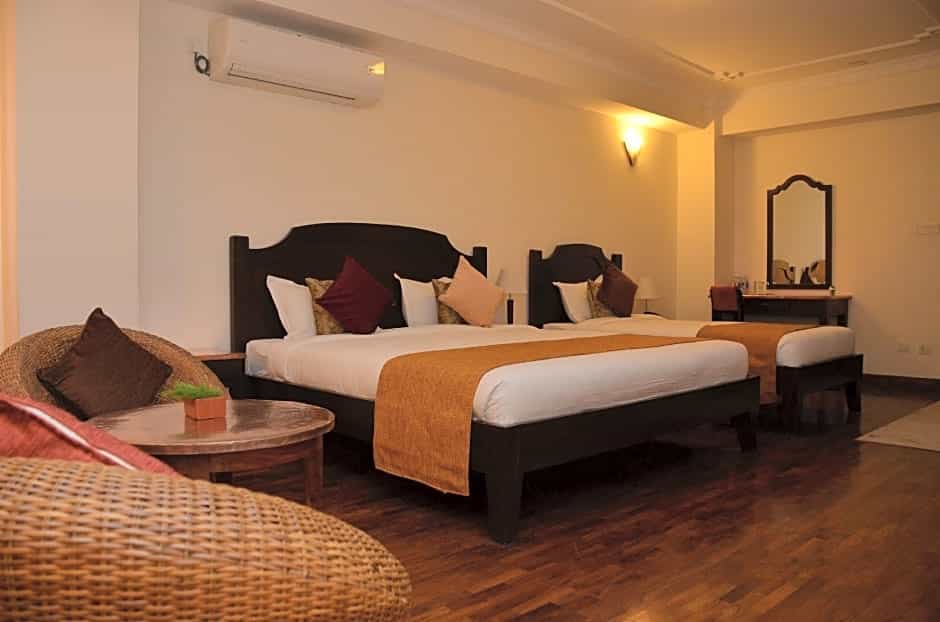
Kathmandu
You’ll stay in a centrally located hotel in the heart of Kathmandu's Thamel district, close to the main shopping area and heritage sites. You'll stay in a twin-share ensuite room, with air-con and WiFi included.
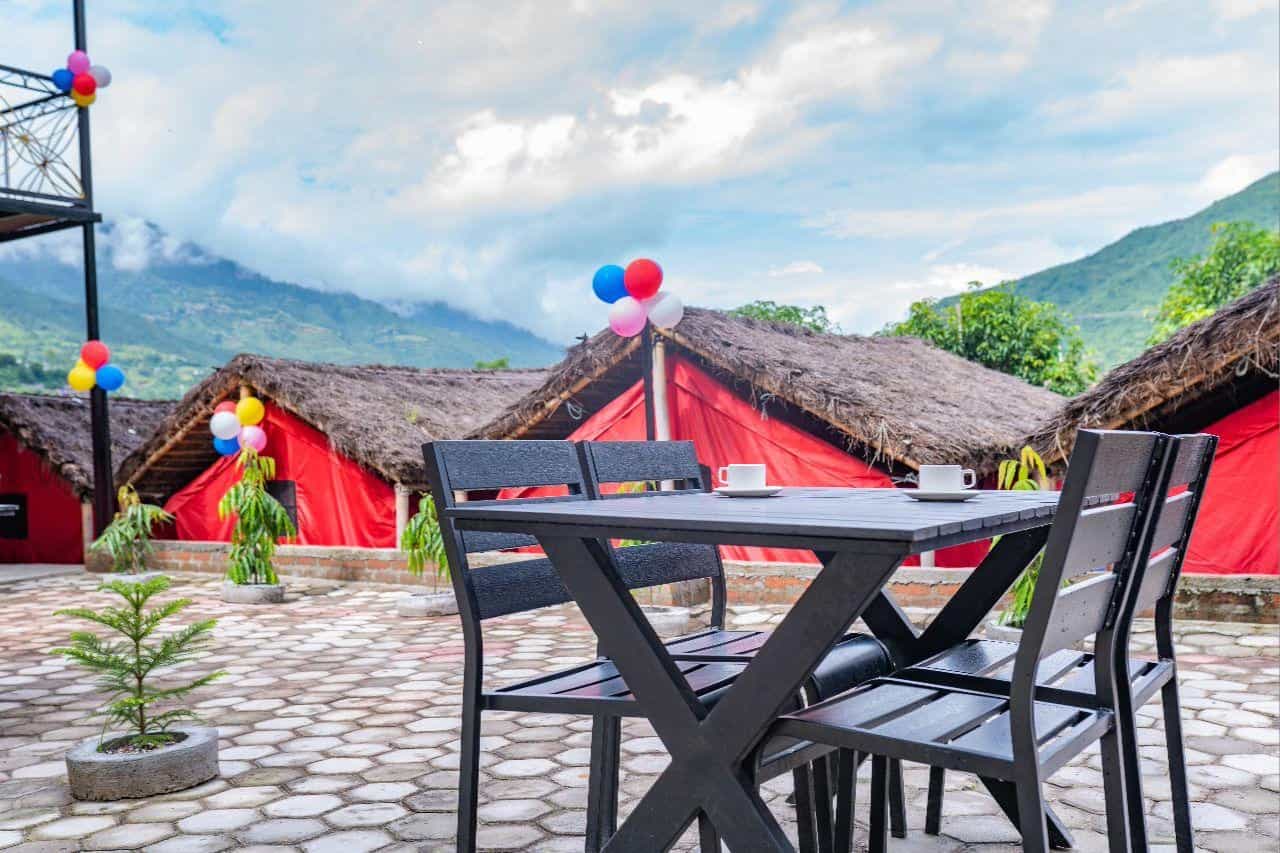
Manthali
For your night in Manthali, you will stay in safari-style tents at the Freedom Resort Fixed Tent Camp. The permanent tents are comfortably set with wooden floors and you will share on a twin-basis with shared bathrooms. There is a swimming pool, restaurant and bar on site.
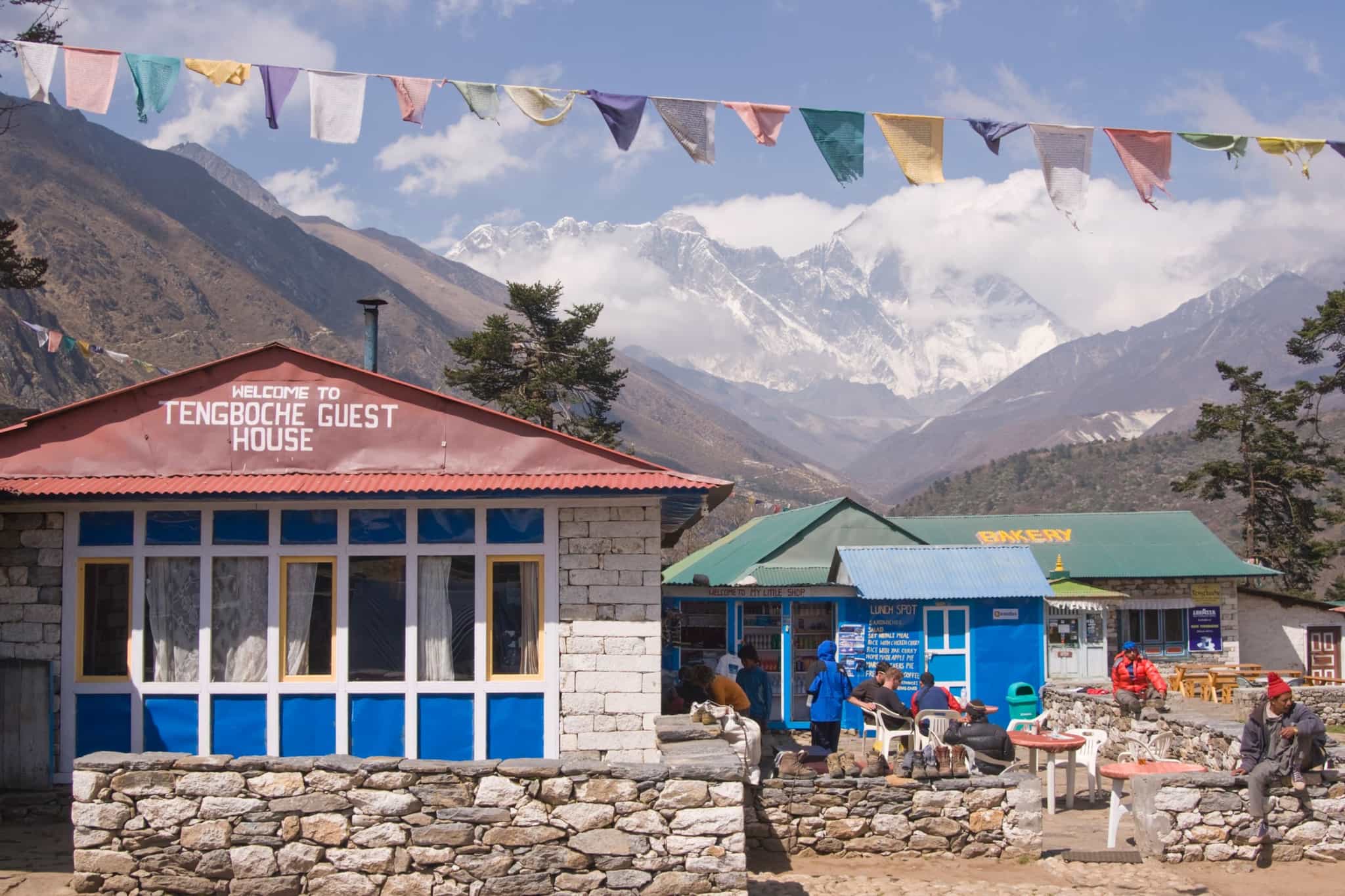
On the trek
Generally, most adventures to Nepal are in remote areas where the accommodation will be basic. On the trek you will stay in traditional Himalayan teahouses – mountain lodges that tend to have a communal dining area and basic toilets. The rooms are sorted by gender – however, if there is an odd number in the group they may occasionally be mixed. There’s no heating, so you'll need your warm sleeping bag. WiFi and hot showers are often available at a small cost. You can usually charge your phone up – again, you guessed it, for a cost. So remember to take an adapter.
Upgrades
For solo travellers looking for their own space, an optional private room can be booked for the two nights in Kathmandu only, subject to availability. This option is not available in the teahouses. Please request this at the time of booking: see Optional Extras below for prices.
This trip has been rated as Moderate
This trip has 4-6 hours of trekking per day, at altitudes up to 3800m. There are a few steep climbs but you have plenty of time to complete each day's trek with downtime in the afternoons. It is important to note that trekking at altitudes above 3000m is more demanding on the body than walking at low elevations.
This trip is a great introduction to Himalayan trekking – as a moderate-graded hike, it's designed to give you a taster of the more challenging Everest Base Camp (EBC) trek. Avoiding the higher reaches of the EBC trek, the altitudes you reach on this trek are less challenging and allow you to focus on the awesome scenery. However, you'll still see many of the same epic mountain views and cultural sites along the way.
To be ready to take on this trip, you'll want to be comfortable hiking back to back days in hilly terrain. Getting out on a couple of practice hikes at the weekends, walking similar daily distances and ascents (5-6 hours, 500-800m ascent), will help prepare your body. Some general exercise (strength, cardio, flexibility) in the weeks building up to your trip will also go along way to ensure you're in the right shape to enjoy this trip.
What will I need to carry?
This trip includes one porter for every two trekkers. They will carry up to 20-25kg of kit so your overnight bags and spare clothes will be transported for you (maximum 12kg per person). You will only need to carry a daypack with essentials in (extra layer, snacks, water, suncream, camera etc.)
There are three different seasons for trekking in Nepal:
Winter (Dec-Feb): Despite being seen as ‘off-season’ this is often the best time to trek in Nepal. The nights can be very cold (down to minus 20°C), but the trails are quieter and the mountain views are often at their best due to the clear sunny skies.
Pre-Monsoon/Spring (March-May): Temperatures rise significantly in spring and flowers are in full bloom in the lower lands. Although it can still drop below freezing at night, the daytime temperatures tend to sit between 10-15°C.
Post-Monsoon/Autumn (Sept-Nov): This is the most popular time to trek in Nepal with sunny and mild days generally. It can get cold and windy at higher altitudes; however, skies are usually clear.
Of course, mountain weather is notoriously hard to predict and snow can be expected on any trip – so do come prepared.
Panorama Trail
On the whole I had an excellent time on the Everest Panorama Trail, this was primarily influenced by the quality of the guides/porters and the stunning scenery.
Our Guides, Kevin and Ujjwal, were excellent, very knowledgeable and personable. Kevin made a particular effort to monitor the health and happiness of all members of the group and dealt admirably with some difficult members. I have been on a couple of similar trekking trips and would say Kevin has been by far the best guide I have ever had, he was extremely professional throughout and I really had the feeling of walking with a friend. Ujjwal did an excellent job of keeping morale high in the team and doubled up as a porter where necessary to ensure that people on the trip got down safely. On one of the days I walked with our porters due to the split in the group and they did an excellent job of ensuring we took breaks when necessary and stopped at the most scenic views, they also did a good job at pointing out specific landmarks etc.
There were aspects of the tour which I would say were poorly organised, particularly the rapid increase in altitude. I would recommend spending an additional night in Namche. As this trek is advertised as "moderate" difficulty and in my opinion the hardest part of these treks is dealing with altitude gain therefore it should be no more extreme than other Everest treks. Additionally, as the trek is advertised as "moderate" you should expect less fit participants, therefore I would suggest that you assign a higher number of guides as our group split due to both fitness and health issues, whilst our porters were great and one of them is in training to be an assistant guide this should not be relied upon.
Itinerary Activities
- 6 days of guided trekking in the Khumbu Valley, between Lukla and Tengboche
Guides
- Expert, English-speaking Sherpa guides
Accommodation
- 2 nights in a 3-star hotel in Kathmandu
- 1 night glamping in a safari tent in Manthali
- 7 nights in teahouses on the trek
Meals
- 2 tasty hotel breakfasts
- 2 dinners in Kathmandu
Internal flights
- Return internal flights between Manthali and Lukla
Transfers
- Arrival transfer from Kathmandu Airport at any time on Day 1
- Departure transfer to Kathmandu Airport at any time on Day 11
- All transfers during the trip
Porterage
- Team of porters to carry all your gear
Permits
- All trekking permits and national park entrances
Our trips are hassle-free by design. We include all the activities and equipment, so you can simply rock up with your rucksack and share the adventure with your new pals.
Travel to and from the trip
Our trips do not include flights, trains or other travel to the start point and back from the end point.
Meals
We do not include meals on the trekking part of this trip, as from experience we know that altitude and physical exercise can mean appetites vary hugely. The cost of food rises as you ascend as it is all carried in by porters and yaks and as you get higher up, very little food can be grown. How much you spend per day will vary according to your choice of meal but generally, people spend between $35-$45 per person, per day on meals and hot drinks. Below is an approximate breakdown of some items:
- Dal baht: $4 to $7
- Chow mein: $2 to $4
- Eggs: $2 to $4
- Toast: $1.50 to $3
- Tea/hot chocolate: $1 to $3
- Chocolate bars: $2 to $4
Teahouses will provide cold water free of charge; however, it needs to be treated to enable you to drink it. Please read the FAQ below regarding our advice here.
Miscellaneous Costs
Other extra costs at the teahouses to be considered are:
- Shower: $2-$4
- WiFi: $2-5
- Electricity: $2-5
See the below FAQ 'What’s Plan B in case of Lukla flight cancellations?' also.
Tips
It is customary in Nepal to tip guides and porters. Although it may not be customary to you, it is of considerable significance to the people who will take care of you during your travels. You can give any tips to your lead guide at the end of your trip. This will then be shared amongst the whole team. For full transparency, the lead guide will distribute the tips to the guides and porters in your presence. It is customary for the guides to receive a higher share than the porters as they are more highly qualified.
A good rule of thumb is around $80-100pp as a tip, although the amount you give is entirely your choice.
If you would like to give an additional tip to a member of the team who has supported you personally, please do so directly and discretely.
Personal expenses
You know your own spending habits best, so please budget an appropriate amount for things like drinks, shopping, optional activities and laundry.
Travel insurance
Travel insurance is compulsory for all of our adventures and you are required to provide your policy information before departing. Your insurance should include adequate protection for overseas medical treatment, evacuation/repatriation, your baggage and equipment and the specific activities involved on your adventure. We also strongly recommend it includes cancellation and curtailment insurance, should you be unable to join your trip for specific reasons such as illness. Our recommended travel insurance provider is Campbell Irvine, as their insurance offers all of the above.
Visas
Visa requirements often change, and you are responsible for obtaining any required visas for this trip. Please check with your nearest embassy or consulate for up-to-date advice.
What do I need to bring?
BAGS
- Day pack with rain cover (30 litre +)
- Rucksack or duffle bag (for the porters to carry overnight kit)
CLOTHES
- Waterproof jacket
- Lightweight down jacket
- Waterproof trousers
- Lightweight trekking trousers
- Hiking shorts (if trekking in the summer)
- Thermals (top and bottom, merino ideal)
- 2-3 trekking t-shirts/shirts
- Fleece or warm mid-layer
- Waterproof thick gloves
- Glove liners
- Hiking socks and lighter walking socks
- Wool hat
- Sun hat
- Spare underwear
- Buff or similar
SHOES
- Worn in waterproof hiking boots
- Lightweight trainers (for the evenings)
SLEEPING
- 3-4 season sleeping bag
- Sleeping bag liner
- Pillow case (optional)
OTHER
- Trekking poles
- Travel towel
- Sun protection (sunscreen, sunglasses)
- 2 water bottles (1 litre each)
- Metal SIGG bottle (useful to fill with hot water to use as a hot water bottle at bedtime)
- Headtorch
- First aid kit and/or personal medication
- Water purification tablets/system
- Biodegradable wet wipes
- Hand gel
- Small biodegradable bags to take toilet tissue off the mountain
- Toilet paper/tissues
- Powerbank
- Universal plug adaptor
- Book/kindle/cards for downtime
What's available to hire?
The below can be rented in Kathmandu:
Down jacket: approximately $1.50 per day, with a deposit of $50
Sleeping bag (only 3-season are available): approximately $2 per day, with a deposit of $80
(Please ask your host if this is needed so they can assist you with how to arrange the hire)
WHAT CAN YOU BUY IN KATHMANDU?
Kathmandu has many outdoor gear shops - some are real with kit that is the same price you will find it at home and some are filled with cheaper imitation gear that may not be of the same quality. You will however find a soft duffel bag easily that the porters can carry.
WEIGHT RESTRICTIONS
There is a weight restriction on the flight to and from Lukla of 10kg checked baggage plus 5kg hand luggage. It is not a problem for you to check in 1-2kg more than this as long as you are happy to pay an excess luggage charge (approx. £1 per kg). Some items may be left in the hotel in Kathmandu if necessary.
Please remove all unnecessary packing before you leave home and ensure you take all plastic off the mountain to be disposed of in Kathmandu.
Pre/post-trip accommodation in Kathmandu (Single)
Payable Before Departure
Pre/post-trip accommodation in Kathmandu (Single)
…
Pre/post-trip accommodation in Kathmandu (Twin/Double)
Payable Before Departure
Pre/post-trip accommodation in Kathmandu (Twin/Double)
…
Optional Private Room Upgrade (2 nights, Kathmandu only)
Payable Before Departure
Optional Private Room Upgrade (2 nights, Kathmandu only)
… Per person
We partner with the World Land Trust to ensure this trip achieves Net-Zero emissions. We also support their Buy an Acre programme, helping local communities to buy and protect natural habitats in perpetuity.
What's the number?
It works out on average at 156kg of CO2 emissions per person, including all local transport, accommodation, food, activities, guides, staff and office operations.
The only thing it doesn’t include right now is flights and travel to the destination. We do make an overall estimate across all our customers separately, but as we don’t book flights, have customers from all corners of the world, and no way of reliably knowing their travel plans, we simply can’t include an individual number in the figure on display here. We’ve got a goal to fix that, so that when you book, there is a way to measure and mitigate the carbon emitted by your flight too.
But what does the number mean?
Yep, hard to picture eh? To give you an idea:
- Driving 1000 miles/1609km would be approximately 281kg of CO2 in an average car (or 140.5kg per person, if there were two of you in it).
- A return economy class flight between London and New York would be approximately 1619kg (1.66 tonnes) per person.
- 10 trees in a temperate forest are estimated to remove approximately 250kg of CO2 from the air in a period of 5-10 years.
What are we doing about it?
Our trips are relatively low-carbon by design, and we're working with all our hosts to develop long term carbon reduction plans. We partner with the World Land Trust to ensure this trip achieves Net-Zero emissions. We also support their Buy an Acre programme, helping local communities to buy and protect natural habitats in perpetuity, ensuring the protection of the reserve and its wildlife.
Want to know more?
Amazingly, no international travel company has ever publicly published their carbon measurements before, as far as we know. We believe that must change, quickly. So we’re openly sharing the method we used in the hope that other companies will be able to more easily follow suit and build on what we've done so far. You'll find it all here.
You will have one trek leader who will accompany you from the start to the end of the trip. From Lukla, you will also be accompanied by one porter per two trekkers.
A mountain flight to Lukla is included on Day 3 of this tour, and back from Lukla on Day 10. Although we schedule departure dates outside of the main monsoon season, weather conditions in any mountain region can be unpredictable. It is not uncommon for flights to and from Lukla to be delayed or cancelled during the trekking season. If your flight to Lukla is cancelled, then your host will revert to 'Plan B', as follows:
You will spend an extra night in Manthali and attempt to fly the next day. If you reach Lukla on Day 4, you'll skip the acclimatisation day in Namche, but the rest of your itinerary will remain the same.
If flights to Lukla are still not operating on Day 4, there may be the option to charter helicopters for the group (subject to availability). Helicopters are less hindered by poor conditions and can often fly when planes cannot. Anyone taking this option will need to pay roughly $500 (USD) extra per person (the full helicopter cost is more than this, but your cancelled Lukla flight will be refunded and deducted from the total price). The exact cost will vary depending on group size, number of helicopters needed, and demand on the given day.
If there are more than two consecutive days of Lukla flight cancellations and it has not been possible to reach Lukla/Kharikhola by the alternative means described above on or before Day 4, your host will offer an alternative itinerary or trek in a different region.
See also 'When should I book my return flight?'
The flight from Lukla to Manthali/Kathmandu at the end of the trip is usually reliable however if the weather is poor cancellations can happen and there is the chance that you will have to fly the next day. So to play it safe we advise you consider booking an extra night’s accommodation in Kathmandu at the end of the trip.
Excess luggage can be left in your hotel in Kathmandu.
Although most teahouses have the option to buy bottled water, we advise against it to reduce the use of plastic in the mountains (this ends up being burnt or in landfill out of sight). You will instead be provided with cold water that needs treating. There is a wide range of products available these days which are more effective than traditional purification tablets - some trekkers like to use UV handheld devices such as a Steripen but other options are available (just check the performance in freezing conditions).
There is a weight restriction on the flight to and from Lukla of 10kg checked baggage plus 5kg hand luggage. It is not a problem for you to check in 1-2kg more than this as long as you are happy to pay an excess luggage charge (approx. £1 per kg). Some items may be left in the hotel in Kathmandu if necessary.
This trip includes one porter for every two trekkers. They will carry up to 20-25kg of kit so your overnight bags and spare clothes will be transported for you (maximum 12kg per person). You will only need to carry a ‘day pack’ with essentials in (extra layer, snacks, water, suncream, camera etc.
The preferred currency is the Nepalese Rupee (NPR). Whilst ATMs are available in the main cities, please do not rely on them as they are often out of order and most have a maximum withdrawal limit equivalent to about GBP300.
It's best to bring the bulk of your money with you in cash and exchange it at a bank or at one of the many money changers in Nepal - your guide will help you with this. Most major currencies are accepted, including GBP (Sterling), Euros and US Dollars, however Scottish or Northern Irish currency cannot be changed. Keep your exchange receipts in case you want to change any unused Rupees back into hard currency when you leave Nepal (it is illegal to export Nepalese Rupees as it is a closed currency).
You will need to carry a fairly large amount of cash while trekking for the meals. We advise that you keep this in a waterproof bag and in your day bag along with your passport.
We work with some of the best leaders in the industry. Every single one of them is government licensed and very experienced. In order to ensure the guides high standard of performance, the host provides them with top-notch in-house training that covers, Leave No Trace (LNT) principles, advanced wilderness first aid, hyperbaric chambers, oxygen system, mountain rescue and incident management.
This trip includes a return domestic flight to Lukla. Nepal's mountainous terrain and weather make for challenging flying conditions and sadly more incidents (including fatalities) occur here than in other countries. Since 2013 the EU has banned all Nepalese domestic airlines from flying within EU airspace in order to raise awareness of the poor safety record (although no Nepalese airlines were operating routes within the EU prior to the ban). You should be aware that flying in Nepal is an identified risk: please consider this carefully before booking. Additional information can be found on the Aviation Safety Network entry for Nepal as well as the UK Foreign, Commonwealth and Development Office travel advice for Nepal. Domestic airlines in Nepal are generally not accredited by any internationally recognised safety audit systems and the Civil Aviation Authority of Nepal does not operate to the same standards as those of Western nations.
What does Much Better Adventures do about this?
Much Better Adventures collaborates with other UK travel companies that arrange for independent air-safety auditors to visit Nepal annually to assess the local airlines. Much Better Adventures then only uses the carriers that were approved as part of the most recent audit. If any concerns are subsequently raised about an approved airline between audits, we put them on hold until the auditors are satisfied that safety standards are being met.
We've sourced some great optional activities for you to do in and around Kathmandu should you wish to explore the area further. Please discuss these directly with your host, who will be able to book them for you.
Cook Like a Local: This short cooking workshop (approximately 3 hours) teaches you how to cook popular Nepali dishes like momos and dal bhat. You'll meet your teacher and accompany them shopping, then head to the kitchen and learn to cook alongside them. Price: pay what you think the workshop is worth!
Shop Local: A 2-3 hour guided exploration of the markets of Kathmandu. Learn about the vendors that line the narrow and crowded alleyways and witness everything you could ever imagine being sold, haggled, or bargained for. It’s a great chance to learn about the melting pot of cultures that exist in Kathmandu. Price: $9-$50 per person, depending on group size.
Master of the Arts: Patan Durbar Square is popular for its handicrafts, and this trip will explore the local factories where they are produced. You’ll visit 2-3 factories and learn about the traditional processes they use and see artwork being produced. Price: $14-$59 per person, depending on group size.
Introduction to Shamanism: Shamanism, which is believed to heal many diseases, is not practiced widely these days. However, this trip enables you to meet a practicing Guru and learn all about this age-old tradition. You’ll visit a small house for an introduction, followed by lunch and then a drumming session where you’ll learn the importance of rhythm to healing. Price: $90-$150 per person, depending on group size.
This trip visits locations at or above 2500m, where some people may experience symptoms of Altitude Sickness, also known as Acute Mountain Sickness (AMS).
Previous experience at altitude doesn’t guarantee the same response again – your body can react differently on each trip. However, having been at altitude before is still valuable: it gives you a better understanding of how your body might respond, what symptoms to look out for, and how to manage your pace and energy levels.
Your guide is trained to manage the risk of altitude sickness by controlling the rate of ascent, monitoring group wellbeing, and responding appropriately if anyone feels unwell.
Before booking, we recommend considering your personal health, particularly if you have any pre-existing conditions, and consulting a medical professional if you’re unsure. Arriving early to allow your body to acclimatise can also make a big difference.
Your travel insurance must cover the maximum altitude reached on this trip and include emergency evacuation.
Sure can! Over 70% of our travellers travel solo, it’s a great way to meet like-minded people.
Our team of Adventure Hunters co-create exclusive adventures which are run by highly vetted, specialist hosts. The trip is run by our trusted host partner in the destination. We only work with independent, local, in-destination experts who know the very best places to explore and how to stay safe. Read more information about the local teams we partner with. You’ll be introduced to the host straight after making a booking via the Much Better Adventures platform.
Much Better Adventures refer to the UK Government’s official travel advice when designing trips and monitoring trip operations. We recommend that all customers are familiar with the practical information provided on the Government’s FCDO website, where current travel advice can be found by searching for the applicable destination(s).
For customers joining this trip from other international destinations – please also read the official travel advice applicable to your country of residence/origin, as this may differ.
We recommend checking out the country-specific information and also talking to a travel nurse.
We automatically convert prices from the local currency that a host receives to your chosen currency. We update our exchange rates on a daily basis so this does mean that prices displayed on the site are subject to currency fluctuations, which is why you may see them change over time.
If you wish to change the currency you pay in, head to the bottom of the page.
All of our group adventures are specially designed for adults to enjoy as we want these adventures to bring together outdoorsy people who are truly like-minded. You must be over 18 to join one of our trips.
You're always in good company on one of our adventures.
Our trips are typically made up of a mixture of solo travellers and small groups of 2 or 3 friends, with most in their 30s-50s.
Our sociable adventures are solo-friendly by design and naturally attract outdoorsy people with a shared mindset; a love for adventure, a desire to push themselves and meet awesome, like-minded people along the way.
It’s this camaraderie that has so often turned a great adventure into a life-changing one.
Don't just take our word for it:
- 95% of people rate the group dynamics on our trips 5/5
- 90% of people recommend joining a trip to make new friends
- 75% of people have met people on our trips that they would now consider friends
See here for more info about the Much Better Adventures tribe.
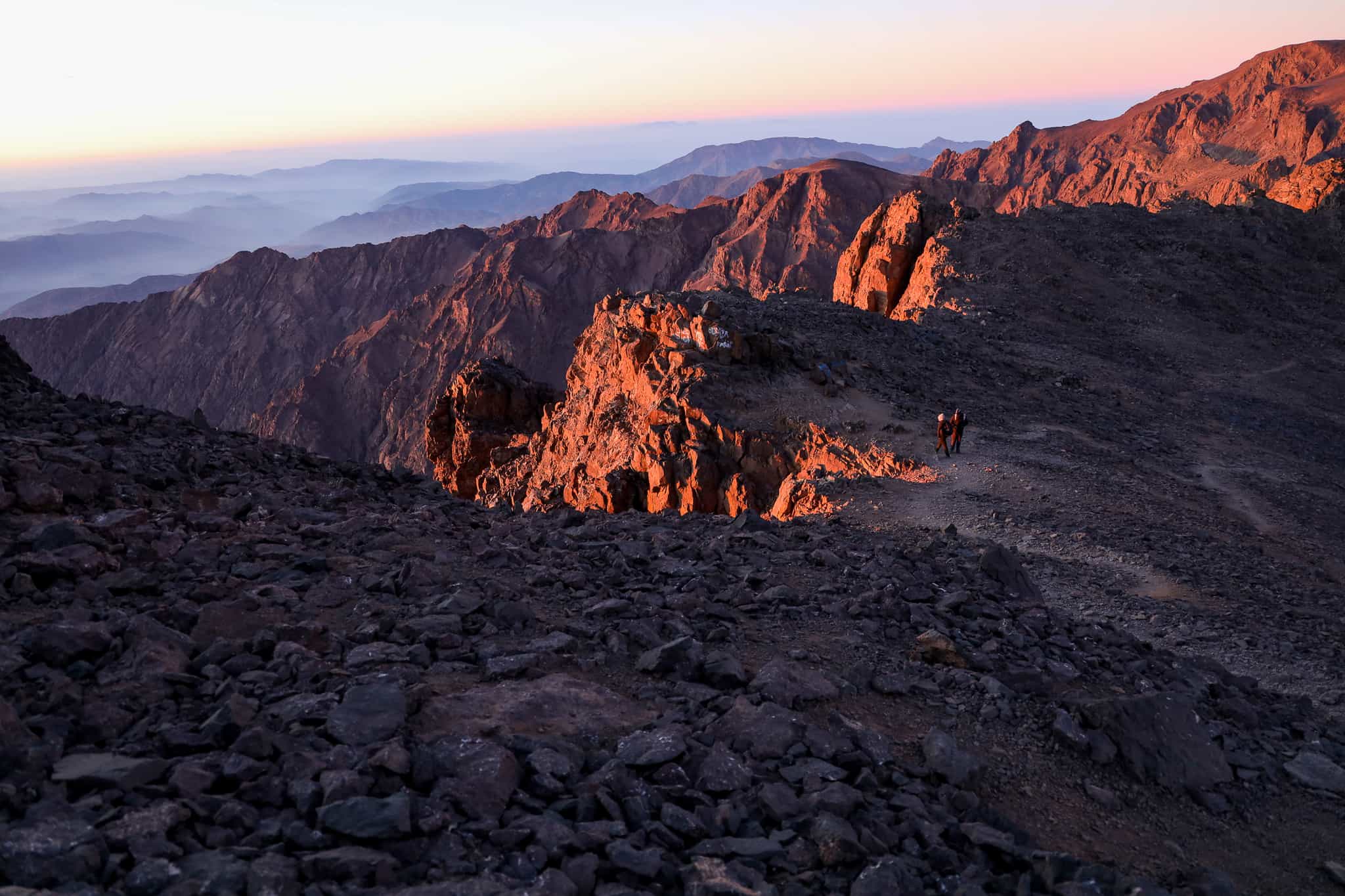
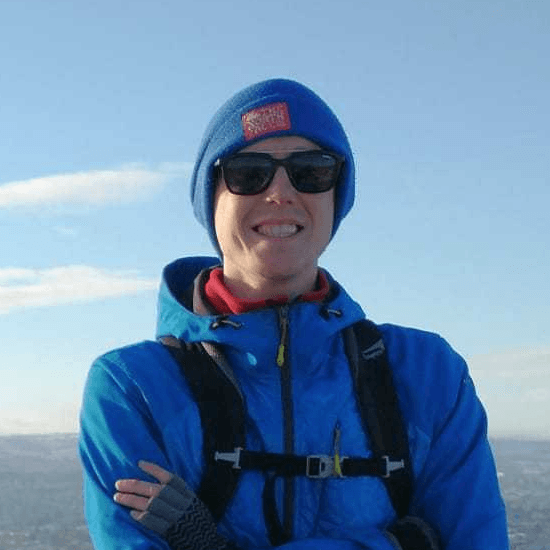
Need help finding flights?
From logistics and how to get there, to fitness, group dynamic and trip difficulty, Rory and his team of friendly experts are on hand to help.
We've got your back
Guaranteed to run
All Much Better Adventures trips are now guaranteed to run. Once you’ve booked your spot you can immediately make your travel arrangements, no uncertainty, no hanging about (excludes 'request to book' departures). Full details
Flexible payments
Secure your spot with the minimum deposit and pay off the remaining balance in as many instalments as you like, with no interest or fees. Full details
Happiness Guarantee
We’re so confident you’ll have an amazing time we’ll put our money on it. Full details
Full financial protection
To give you complete peace of mind Much Better Adventures is backed by ABTOT, ABTA and ATOL memberships. Full details
Tried & Trusted
Much Better Adventures is rated ‘Excellent’ on Trustpilot with over 1000 verified trip reviews averaging 4.8/5.
Connect before you go
You'll be invited to join a WhatsApp group to get to know each other before your big adventure together. Full details
DEPARTURE DATES
Friday 17th October 2025
to Monday 27th October 2025
